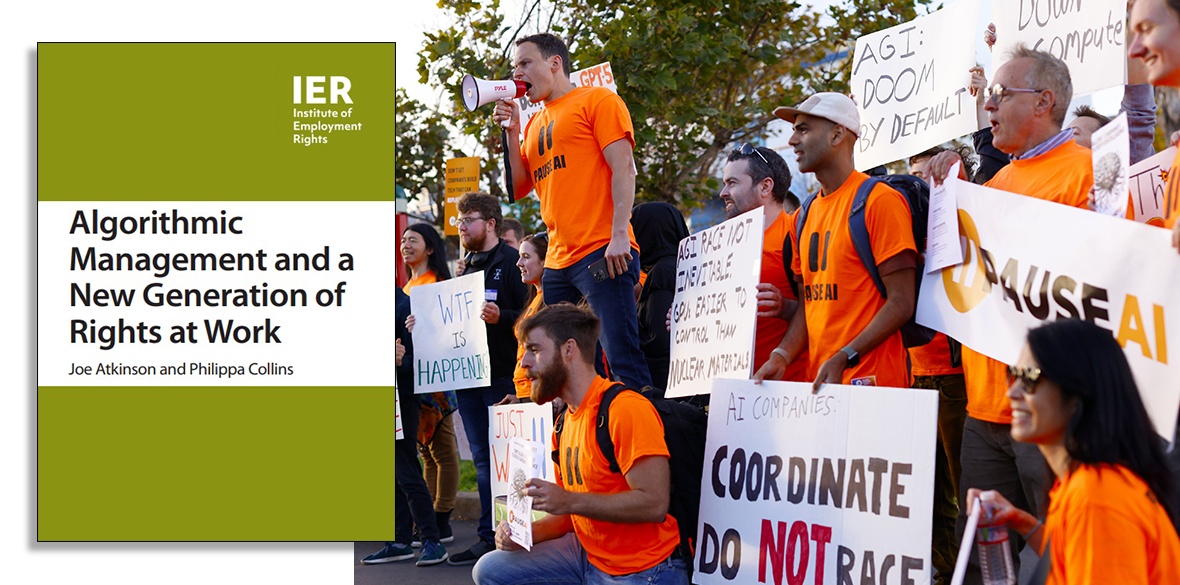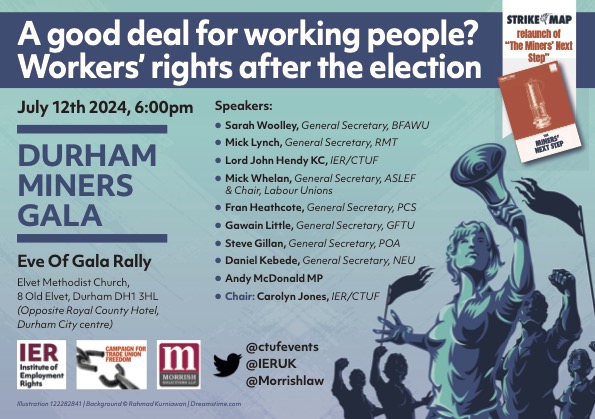Category: Uncategorized
Implementing the TUC’s AI Bill Is A No Brainer
 The TUC’s Draft AI Bill and a new IER booklet on AI point the way forward for Labour to protect workers
The TUC’s Draft AI Bill and a new IER booklet on AI point the way forward for Labour to protect workers
By Tony Burke Co-chair of the Campaign For Trade Union Freedom
The Institute Of Employment Rights booklets have for years provided an authoritative analysis of employment rights issues and in some instances have pointed the way forward and helped draft future employment legislation.
IERs new ‘Algorithmic Management And A New Generation Of Rights At Work’, written by Dr Joe Atkinson (University of Southampton) and Professor Philippa Collins (University of Bristol) is one such booklet that all incoming Labour MPs should read along with the TUC’s draft ‘Artificial Intelligence (Employment and Regulation) Bill’.
How AI will effect workers has been much talked about. A low point was Sunak’s ‘AI Summit’ at Bletchley Park to which unions were not invited and ended as little more than photo opportunity for Sunak to smooze with Elon Musk.
I have no doubt there will be many benefits for working people and society from the use of AI, but one of its biggest drawbacks is AI’s potential for intrusiveness coupled with the ability to produce in nono-seconds what it would take humans to do in hours.
As Unite National Officer for the Media Louisa Bull (one of the areas where there will be a big downside to the use of AI could be in the media) and where the union is busy organising digital and tech workers told the global union Union Network International: “It is never acceptable to pass off responsibility for key decisions to non-human agents and yet that is happening”.
The authors rightly point out that: “Technology has revolutionised the way we work over the last 30 years, and is now changing radically the way in which working people are managed.
“Rapid advances in ‘artificial intelligence’ have given rise to complex and powerful algorithmic management tools that pose an increasing threat to the right of workers to enjoy decent working conditions and exercise agency over their working lives.”
Although the Labour manifesto has a reference to “updating regulations to outlaw the use of predictive technologies for blacklisting and safeguard against the singling out of workers for mistreatment or the sack without any evidence of human interaction” overall the current outdated employment protections will just not be enough to provide the protections workers will need.
As the authors point out – with collective bargaining in the UK at low levels – for millions of people protection will not be available to those engaged in business models that exploit workers.
They correctly contend that what is needed is: “a new regulatory framework giving workers and unions a genuine voice in the use of algorithmic management tools, alongside recognition and protection of their rights and access to justice that ensures their employers can be held to account”.
Without widespread sectoral collective bargaining a new frame work of protection for non-human interventions and decisions underpinned by law, not a toothless code of practice – is now essential.
Coupled with the TUC’s recent work, this LRD booklet sets out the way forward. A Labour government needs to agree wider employment protections in consultation with those unions already in at the deep end and have members working and organising in digital and tech companies such as Unite, Prospect, Equity, NUJ, CWU along with the TUC to implement the TUCs ‘Artificial Intelligence (Employment and Regulation) Bill’ as first step.
For Labour the spade work already done – coupled with the research by Atkinson and Collins’ work – its a no brainer.
Originally published in the Morning Star 17th June.
Aslef Is Defying The Anti Strikes Act
 By Mick Whelan General Secretary of Aslef, the train drivers’ union.
By Mick Whelan General Secretary of Aslef, the train drivers’ union.
Strikes they say, don’t work. Well, that’s what the Tory government and papers such as the Sun, Daily Mail, and Daily Telegraph would like you to believe. Of course it is. Because the dirty little truth — and it is the truth — is that strikes do work.
They always have. They always will. That’s why employers and the Tory governments that always stand behind the bosses don’t like them. Reflect, for a moment, on our current dispute with 16 train operating companies which began back in June 2022 when we first balloted our members for industrial action because they hadn’t had a pay rise since April 2019.
It was only six and a half months later — and, more pertinently, after six one-day strikes — that the train companies, in the form of the Rail Delivery Group (RDG), an organisation that lobbies the government on behalf of some, but not all, of the passenger and freight companies in England, Scotland, and Wales, finally made us an offer. The Secretary of State for Transport — Grant Shapps, Anne-Marie Trevelyan, and Mark Harper have all walked through the revolving turnstile on the door at the DfT in the last two years — and the Rail Minister — whether Wendy Morton, Kevin Foster, or Huw Merriman — kept parroting the party line that “Aslef should come to the table.”
Well, we did. But the table was bare. The companies were putting nothing on the table until we showed our collective determination to win a pay rise by going on strike. It’s that solidarity — collective action — which employers hate. At heart, many bosses are like Victorian mill owners: they want to hire and fire as they see fit. They love the idea of the foreman walking along a 19th-century wharf first thing in the morning saying: “You, you, and you are hired. The rest of you can go home.” They don’t like the “burden” — as they see it, and say it, but never sort it — of employing men and women. Of paying proper wages. Taxes. National Insurance and pensions.
That’s why they love the gig economy, false self-employment, and zero-hours contracts which the labour movement — and the Labour Party in its New Deal for Working People — will bring in legislation to ban. Bosses often claim that “zero-hours contracts offer workers flexibility.” But not decent terms and conditions, proper employment rights, or secure jobs. And what they really, really, really don’t like is when workers come together, in a trade union, to act collectively.
They haven’t liked it since the Tolpuddle Martyrs, in 1834, had the temerity to form a trade union and ask for proper wages when employers were slashing wages in Dorset to poverty levels and leaving agricultural workers and their families to starve. And that’s why they sentenced six workers to transportation. Because our strikes have been successful in bringing the railway network in this country to a standstill the government rushed through its Minimum Service Levels Act at the end of last year.
This Act, initially proposed by Grant Shapps, had, and has, nothing to do with providing a minimum service to the public — specifically, passengers, on the railway — and everything to do with providing maximum problems for trade unions. Threatening us with fines if we put a foot wrong and, fundamentally, trying to undermine the effectiveness of industrial action and our ability to protect members. It was the success of Aslef’s strikes after we first walked out in July 2022 which led the Tory government to bring in this law in an effort to neutralise us in our fight for fair pay.
That’s why we fought so hard — and, so far, so successfully — against the implementation of the Act. When one operator said it intended to issue work notices to our members, for the one day we were due to go on strike, we immediately put on another five days of strikes — more industrial action, as we had promised, to get the same effect — and LNER saw sense and promptly backed down. Aslef has been proud to stand with colleagues and comrades in what the Morning Star, at a very lively public meeting on Thursday March 7th, called “defiance not compliance.”
Nobody wanted to be first in the firing line, but it fell to us, and we were pleased to stand up, in solidarity with our friends in the Labour Party, labour movement, and the TUC, against this pernicious piece of spiteful legislation. We did it for passengers, as well as for staff; we did it for everyone who works and travels on our railways.
And we did it for every worker here in Britain. Because we don’t believe in forced labour. We believe in the right to strike. And we know — as this Tory government knows — that strikes are effective. Earlier this month, the RDG reached out to us for “talks about talks” to try to resolve our pay dispute with 16 train companies. They would not have done that if we had not taken industrial action. Yes, that’s right. Strikes work.
Mick Whelan has spent 40 years on the railway, and 40 years as an active trade unionist. He was elected general secretary of Aslef in 2011, became chair of the Trade Union and Labour Party Liaison Organisation, now Labour Unions, in 2016, and in 2017 was elected to the Labour Party NEC.
This article first appeared in the Morning Star on May 20th.
Mandelson Attempt To Destabilise New Deal For Workers Backfires

Letter published in the Morning Star sent March 4th by Co-Chair Of CTUF
So Lord Mandelson’s has told Labour that it must not “betray business” with the flagship reforms to workers rights contained in the New Deal For Workers, arguing that Labour should slow down and “provide clarity” on the New Deal.
The independent think tank Labour Together has also said Labour should assess the reforms on the private sector and recently the CBI President told Labour to rethink what he described as ‘European style’ pro worker legislation of the New Deal.
In my experience every time a Labour Government proposes pro worker employment legislation – from the National Minimum Wage, the Health & Safety At Work Act, protection during collective redundancies, equal rights for woman, part time and agency workers etc the Tories, the CBI, the Institute of Directors and parts of the media predict any new legislation to protect workers will damage the economy, create unemployment or mean the end of the world as we know it.
It has never happened.
Frances O’Grady former TUC General Secretary was right to tweet in response to Mandleson: “A shocking 1.1m people on zero hours, 3.7m jobs paid below the real Living Wage and the UK has one of the worst income inequality rates in the OECD. Meanwhile productivity, investment and growth are at rock bottom. The rules are rigged against working people. Time to modernise”.
Labour has been clear that the New Deal legislation will be introduced within 100 days of coming into office. As Mick Whelan, ASLEF General Secretary and chair of Labour & Unions (TULO) told a recent meeting of trade unionists and lawyers that at meetings he has attended with the shadow cabinet including Keir Starmer on the New Deal up to now there has been no changes to the New Deal commitments.
Mandelson is trying to destabilise Labour as he knows unions will hold Labour to these commitments and that pro worker protections, ending zero hours, fire & rehire, introducing rights from day one are popular with voters and is doing the bidding of the Tories, the CBI and some in the media. He should keep out of it.
Tony Burke
Co-Chair Campaign For Trade Union Freedom

